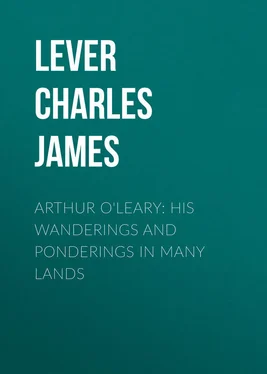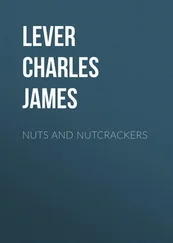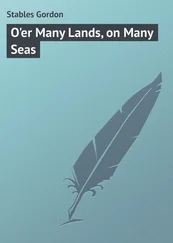Charles Lever - Arthur O'Leary - His Wanderings And Ponderings In Many Lands
Здесь есть возможность читать онлайн «Charles Lever - Arthur O'Leary - His Wanderings And Ponderings In Many Lands» — ознакомительный отрывок электронной книги совершенно бесплатно, а после прочтения отрывка купить полную версию. В некоторых случаях можно слушать аудио, скачать через торрент в формате fb2 и присутствует краткое содержание. Издательство: Иностранный паблик, Жанр: literature_19, foreign_antique, foreign_prose, на английском языке. Описание произведения, (предисловие) а так же отзывы посетителей доступны на портале библиотеки ЛибКат.
- Название:Arthur O'Leary: His Wanderings And Ponderings In Many Lands
- Автор:
- Издательство:Иностранный паблик
- Жанр:
- Год:неизвестен
- ISBN:нет данных
- Рейтинг книги:3 / 5. Голосов: 1
-
Избранное:Добавить в избранное
- Отзывы:
-
Ваша оценка:
- 60
- 1
- 2
- 3
- 4
- 5
Arthur O'Leary: His Wanderings And Ponderings In Many Lands: краткое содержание, описание и аннотация
Предлагаем к чтению аннотацию, описание, краткое содержание или предисловие (зависит от того, что написал сам автор книги «Arthur O'Leary: His Wanderings And Ponderings In Many Lands»). Если вы не нашли необходимую информацию о книге — напишите в комментариях, мы постараемся отыскать её.
Arthur O'Leary: His Wanderings And Ponderings In Many Lands — читать онлайн ознакомительный отрывок
Ниже представлен текст книги, разбитый по страницам. Система сохранения места последней прочитанной страницы, позволяет с удобством читать онлайн бесплатно книгу «Arthur O'Leary: His Wanderings And Ponderings In Many Lands», без необходимости каждый раз заново искать на чём Вы остановились. Поставьте закладку, и сможете в любой момент перейти на страницу, на которой закончили чтение.
Интервал:
Закладка:
We read a great deal about Cincinnatus cultivating his cabbages, and we hear of Washington’s retirement when the active period of his career had passed over, and a hundred similar instances are quoted for our admiration, of men, who could throw themselves at once from all the whirlwind excitement of great events, and seek, in the humblest and least obtrusive position, an occupation and an enjoyment. But I doubt very much if your ex-man of fashion, your ci-devant winner of the Derby – the adored of Almack’s – the enfant chéri of Crockford’s and the Clarendon, whose equipage was a model, whose plate was perfection, for whom life seemed too short for all the fascinations wealth spread around him, and each day brought the one embarrassment how to enjoy enough. I repeat it, I doubt much if he, when the hour of his abdication arrives – and that it will arrive sooner or later not even himself entertains a doubt – when Holditch protests, and Bevan proceeds; when steeds are sold at Tattersall’s, and pictures at Christie’s; when the hounds pass over to the next new victim, and the favourite for the St. Léger, backed with mighty odds, is now entered under another name; when in lieu of the bright eyes and honied words that make life a fairy tale, his genii are black-whiskered bailiffs and auctioneers’ appraisers – if he, when the tide of fortune sets in so strong against him, can not only sustain himself for a while against it, and when too powerful at last, can lie upon the current and float as gaily down, as ever he did joyously, up, the stream – then, say I, all your ancient and modern instances are far below him: all your warriors and statesmen are but poor pretenders compared to him, they have retired like rich shopkeepers, to live on the interest of their fortune, which is fame; while he, deprived of all the accessories which gave him rank, place, and power, must seek within his own resources for all the future springs of his pleasure, and be satisfied to stand spectator of the game, where he was once the principal player. A most admirable specimen of this philosophy was presented by our new passenger, who, as he lounged against the binnacle, and took a deliberate survey of his fellow-travellers, seemed the very ideal of unbroken ease and undisturbed enjoyment: he knew he was ruined; he knew he had neither house in town, or country; neither a steed, nor a yacht, nor a preserve; he was fully aware, that Storr and Mortimer, who would have given him a mountain of silver but yesterday, would not trust him with a mustard-pot today; that even the “legs” would laugh at him if he offered the odds on the Derby; and yet if you were bound on oath to select the happiest fellow on board, by the testimony of your eyes, the choice would not have taken you five minutes. His attitude was ease itself: his legs slightly crossed, perhaps the better to exhibit a very well-rounded instep, which shone forth in all the splendour of French varnish: his travelling cap jauntily thrown on one side, so as to display to better advantage his perfumed locks, that floated in a graceful manner somewhat lengthily on his neck; the shawl around his neck had so much of negligence, as to show that the splendid enamel pin that fastened it, was a thing of little moment to the wearer: all were in keeping with the nonchalant ease, and self-satisfaction of his look, as with half-drooping lids he surveyed the deck, caressing with his jewelled fingers the silky line of his moustache, and evidently enjoying in his inmost soul the triumphant scene of conquest his very appearance excited. Indeed, a less practised observer than himself could not fail to remark the unequivocal evidences the lady portion of the community bore to his success: the old ones looked boldly at him with that fearless intrepidity that characterizes conscious security – their property was insured, and they cared not how near the fire came to them; the very young participated in the sentiment from an opposite reason – theirs was the unconsciousness of danger; but there was a middle term, what Balzac calls, “ la femme de trente ans ,” and she either looked over the bulwarks, or at the funnel, or on her book, any where in short but at our friend, who appeared to watch this studied denial on her part, with the same kind of enjoyment the captain of a frigate would contemplate the destruction his broadsides were making on his enemy’s rigging – and perhaps the latter never deemed his conquest more assured by the hauling down of he enemy’s colours, than did the “Honourable Jack,” when a letdown veil convinced him that the lady could bear no more.
I should like to have watched the proceedings on deck, where, although no acquaintance had yet been formed, the indications of such were clearly visible: the Alderman’s daughters evincing a decided preference for walking on that side where Jack was standing, he studiously performing some small act of courtesy from time to time as they passed, removing a seat, kicking any small fragment of rope, &c.; but the motion of the packet began to advertize me that note-taking was at an end, and the best thing I could do would be to compose myself.
“What’s the number, sir?” said the steward, as I staggered down the companion.
“I have got no berth,” said I mournfully.
“A dark horse, not placed,” said the Honourable Jack, smiling pleasantly as he looked after me, while I threw myself on a sofa, and cursed the sea.
CHAPTER II. THE BOAR’S HEAD AT ROTTERDAM
If the noise and bustle which attend a wedding, like trumpets in a battle, are intended as provisions against reflection, so firmly do I feel, the tortures of sea-sickness, are meant as antagonists to all the terrors of drowning, and all the horrors of shipwreck.
Let him who has felt the agonies of that internal earthquake which the “pitch and toss” motion of a ship communicates – who knows what it is, to have his diaphragm vibrating between his ribs and the back of his throat, confess, how little to him was all the confusion which he listened to, over head! how poor the interest he took in the welfare of the craft wherein he was “only a lodger,” and how narrowed were all his sympathies within the small circle of bottled porter, and brandy and water, the steward’s infallibles in suffering.
I lay in my narrow crib, moody pondering over these things, now wondering within myself, what charms of travel could recompense such agonies as these; now muttering a curse, “not loud, but deep,” on the heavy gentleman, whose ponderous tread on the quarter-deck seemed to promenade up and down the surface of my own pericranium: the greasy steward, the jolly captain, the brown-faced, black-whiskered king’s messenger, who snored away on the sofa, all came in for a share of my maledictions, and took out my cares, in curses upon the whole party. Meanwhile I could distinguish, amid the other sounds, the elastic tread of certain light feet that pattered upon the quarter-deck; and I could not mistake the assured footstep which accompanied them, nor did I need the happy roar of laughter that mixed with the noise, to satisfy myself that the “Honourable Jack” was then cultivating the Alderman’s daughters, discoursing most eloquently upon the fascinations of those exclusive circles wherein he was wont to move, and explaining, on the clearest principles, what a frightful chasm his absence must create in the London world – how deplorably flat would the season go off, where he was no actor – and wondering, who, among the aspirants of high ambition, would venture to assume his line of character, and supply his place, either on the turf, or at the table.
But at length the stage of semi-stupor came over me; the noises became commixed in my head, and I lost all consciousness so completely, that, whether from brandy or sickness, I fancied I saw the steward flirting with the ladies, and the “Honourable Jack” skipping about with a white apron, uncorking porter bottles, and changing sixpences.
Читать дальшеИнтервал:
Закладка:
Похожие книги на «Arthur O'Leary: His Wanderings And Ponderings In Many Lands»
Представляем Вашему вниманию похожие книги на «Arthur O'Leary: His Wanderings And Ponderings In Many Lands» списком для выбора. Мы отобрали схожую по названию и смыслу литературу в надежде предоставить читателям больше вариантов отыскать новые, интересные, ещё непрочитанные произведения.
Обсуждение, отзывы о книге «Arthur O'Leary: His Wanderings And Ponderings In Many Lands» и просто собственные мнения читателей. Оставьте ваши комментарии, напишите, что Вы думаете о произведении, его смысле или главных героях. Укажите что конкретно понравилось, а что нет, и почему Вы так считаете.












